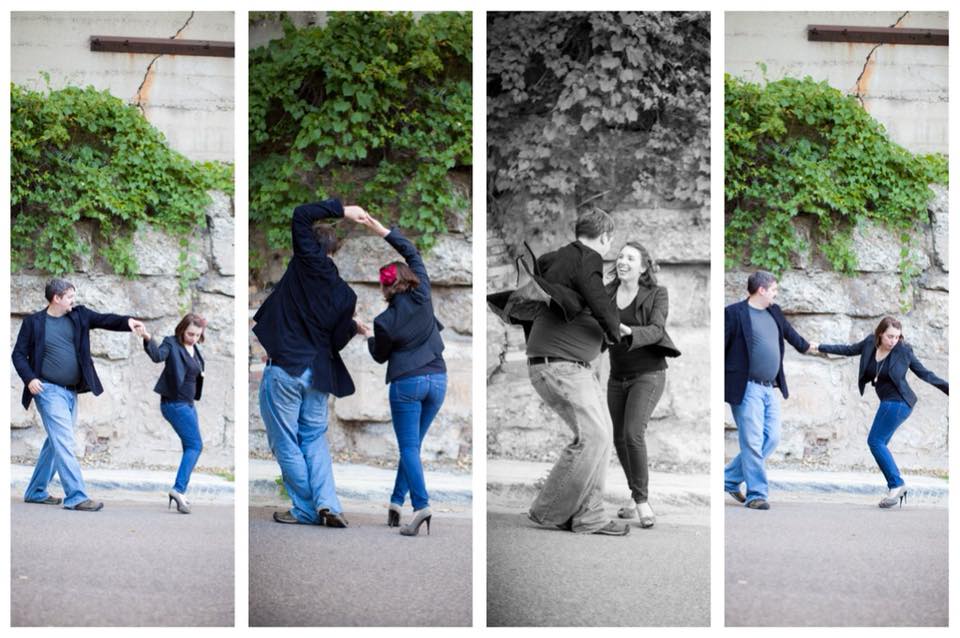There are few stories told in TV shows and movies about people like me in romantic relationships, and those stories that are told rarely paint being with someone like me as desirable. Me Before You is perhaps the most extreme depiction of this type, painting disability as a fate worse than death for a relationship. I imagine abled people have no idea how it feels to be surrounded by messages implying that no one could ever want to be with you: if they did, they wouldn’t write stories like this, would they?
When we got married five years ago, Karl and I were more different than we were alike, our strengths balancing each other’s weaknesses. In the years since, as happens with most couples, we’ve grown together, becoming more alike and, somehow, more different at the same time. Our story is not a fairy tale, but it’s also not the tragic picture painted by Hollywood of relationships involving disabled people. Instead, our story is a lesson in empathy practiced by real people who certainly don’t understand each other all the time, but will always continue to try.
In that sense, I suppose we’re not that much different from abled couples. Karl’s seeming inability to wipe down the sink after he trims his beard, leaving a bazillion obnoxious, tiny hairs everywhere, will never cease to annoy me. Likewise, he tells me that my habit of putting the empty toilet roll not in the garbage but on the back of the toilet drives him up a wall. Every couple I’ve ever talked to has a similar story: quite a few of them seem to involve socks not in the hamper, but next to it. These are the small conflicts we make a practice of letting go, attempting to remember that loving someone is more important than a spotless bathroom.
Yet, in so many other ways, our love story is shaped by ability and disability. Abled couples will never know the uncomfortable stare of a stranger trying to figure out why someone so young walks with a cane. How amusing it is to me that they never stare the same way at people wearing glasses. They will never know what it’s like to arrive at an event, realize that it’s up a flight of stairs, and have to turn around with disappointment because someone’s knee is acting up and stairs just aren’t happening today. Abled couples will live in an environment built for their bodies and minds. Meanwhile, the burden will be on me and my husband to ask if a space is accessible to me and to know that, if it’s not, people like me, couples like us, were an afterthought, if a thought at all. When most spaces are not designed for people like me, of course we feel as though we are undesired: it is not just TV shows and movies that tell this story, but the very spaces we occupy that demarcate which bodies are welcome and which are not.
Nor will abled couples understand the unique ways chronic pain influences a relationship. The last time I remember being without pain, I was 17 years old. Perhaps you, the reader, are feeling bad for me right now, as Karl often has before. Yet, as I have taught Karl, it is not the pain itself that is negative: pain is equal parts teacher as it is a cause of suffering. To learn ways of navigating both the lessons and the suffering, and to learn how to value the lessons more than we hate the pain, these are no small tasks for any couple. Pain has taught both of us to feel more compassionately toward others and each other, to desire to serve others, and to work for justice: these are valuable lessons.
This is not to say that living with chronic pain is easy: while I would not trade the lessons pain has taught me, there are days I look at Karl with a bit of jealousy. Karl is not just able-bodied; he’s the kind of able-bodied that goes for 50-mile bike rides multiple times a week and spends time on weekends building trails in parks. His tall, lanky, fit frame could not present more of a contrast to my petite crippled self. My task, then, is to work on my jealousy, and his task is to avoid feeling bad for me, as in this case, it is not the pain that has caused the suffering, but our reactions to it. And, of course, there are some days when the pain is pure physical agony, when such philosophical musings can change nothing. Abled couples are not faced with the immediacy of learning these lessons, but Karl and I often joke that when all our bodies grow old, Karl and I will have the most practice navigating this dynamic.
Disability is also not just physical, and stigma surrounding disability and relationships extends into the worlds of developmental disability, intellectual disability, and mental health. As an Autistic person, I know how painful it is to read stereotypes about people like me being unable to love or feel empathy, or to understand the implications of the anti-vaccination movement: that parents who falsely believe vaccines cause autism would rather have children dead from preventable diseases than have them be like me. I know that the stigma surrounding relationships and sexuality is even stronger for people with intellectual disabilities, who can love and be loved too. The relationship that Karl and I share is beautiful, not in spite of my disability, but in part because of it.

I share our story because we live in a world where social movements talk about marriage equality, but leave disabled couples out of the equation. Many people with disabilities rely on programs like Medicare, Medicaid, SSI, and SSDI, among others because these programs are the only way to afford necessary services. Qualifying for these services essentially means living in poverty, and often means that getting married would result in losing these services. In this sense, Karl and I are privileged because my care needs are mostly covered by insurance and not particularly expensive beyond what is covered. This meant we could get married without worrying about the impact on my quality of life, an option not available to many people with more extensive care needs. I want to live in a world that does not force any disabled person to choose between basic necessities and marriage, a fundamental injustice too often ignored.
I also share our story because our society needs to grow in its understanding of disability and romance, as viewing all disabled people as incapable of understanding romance and sexuality comes at significant cost. People with intellectual disabilities are seven times more likely to be the victim of sexual assault than people without disabilities,[1] while people with disabilities generally are 2.5 times more likely to be victimized than people without disabilities.[2] While lack of oversight, insufficient caregiver background checks, and other factors are significant, not teaching people with certain disabilities, especially intellectual and developmental disabilities, about their bodies and about consent also plays a role.
I want to live in a culture where sexual education teaches people about more than just straight abled sex in a shame-based abstinence model. I want people to learn about how good sex can be with queer people, with disabled people, with people that don’t fit the sex ed workbook norm. I want people to learn how to make love with people like and unlike them, reveling in their bodies and their personhood, recognizing and valuing their differences, asking for enthusiastic consent and guidance.
I want a world where disabled people learn how to have healthy relationships alongside their abled peers, where disabled people are seen as valuable friends, lovers, partners, spouses not in spite of their disability but because disability adds to the fullness and beauty of their being. I want a world where abled people compliment my sparkly cane much like they would a stylish pair of glasses, accepting it as an emblem of who I am, rather than wondering from across the room why I need it. Ultimately, I want a society that teaches disabled people, through media portrayals, through accessible building design, and so many other avenues, that their bodymind, their personhood is valuable and worthy of love just the way they are.
Jessica Benham,
Director of Development at The Pittsburgh Center for Autistic Advocacy
[1] https://www.npr.org/2018/01/08/570224090/the-sexual-assault-epidemic-no-one-talks-about


